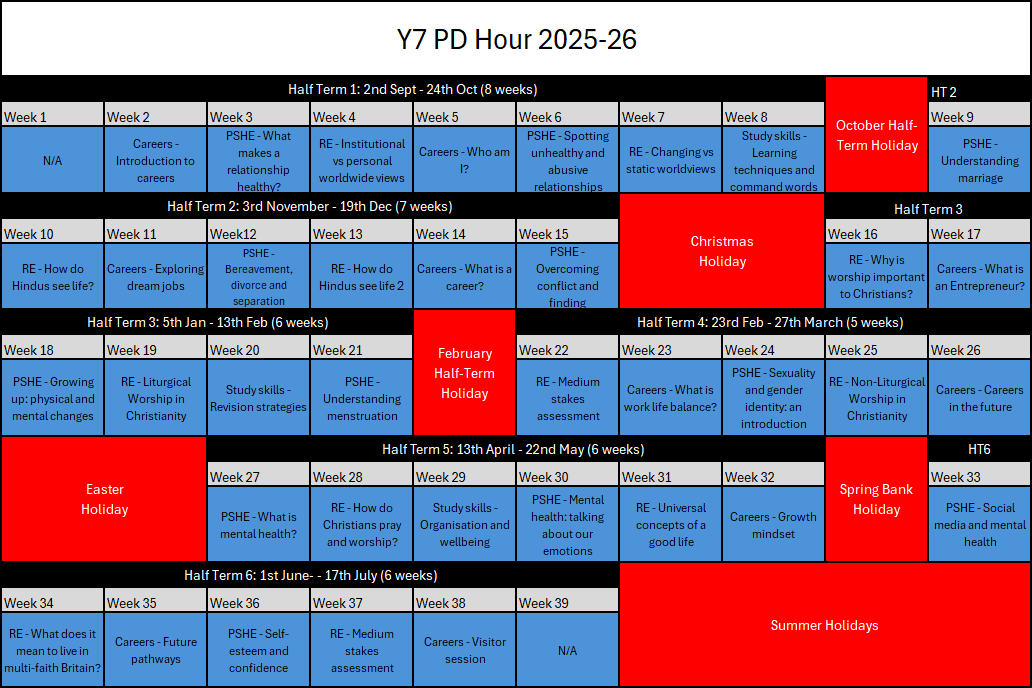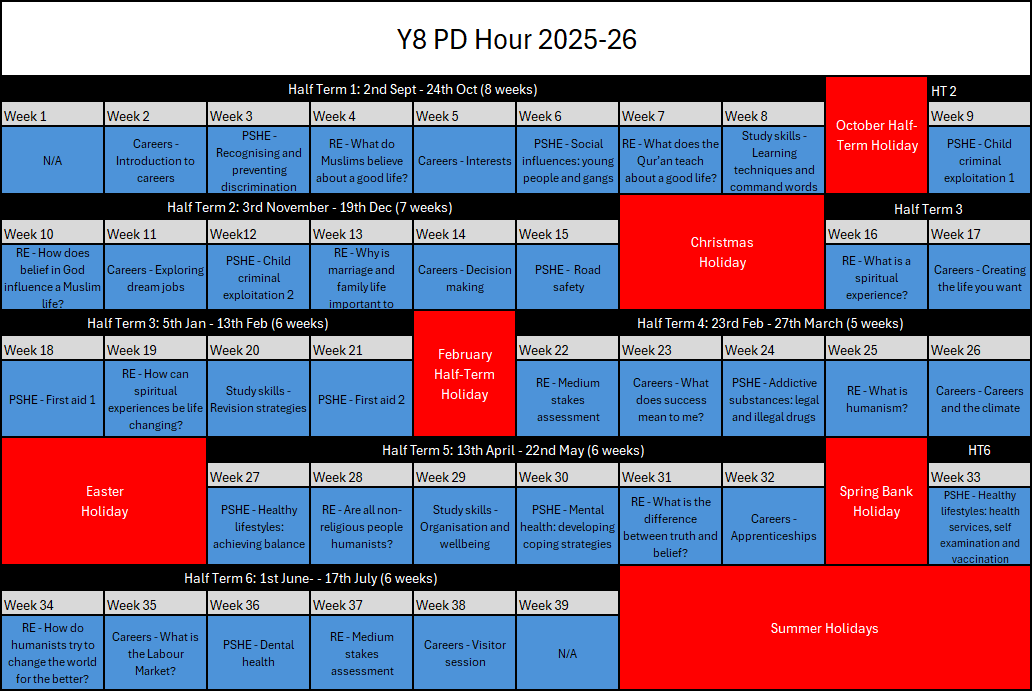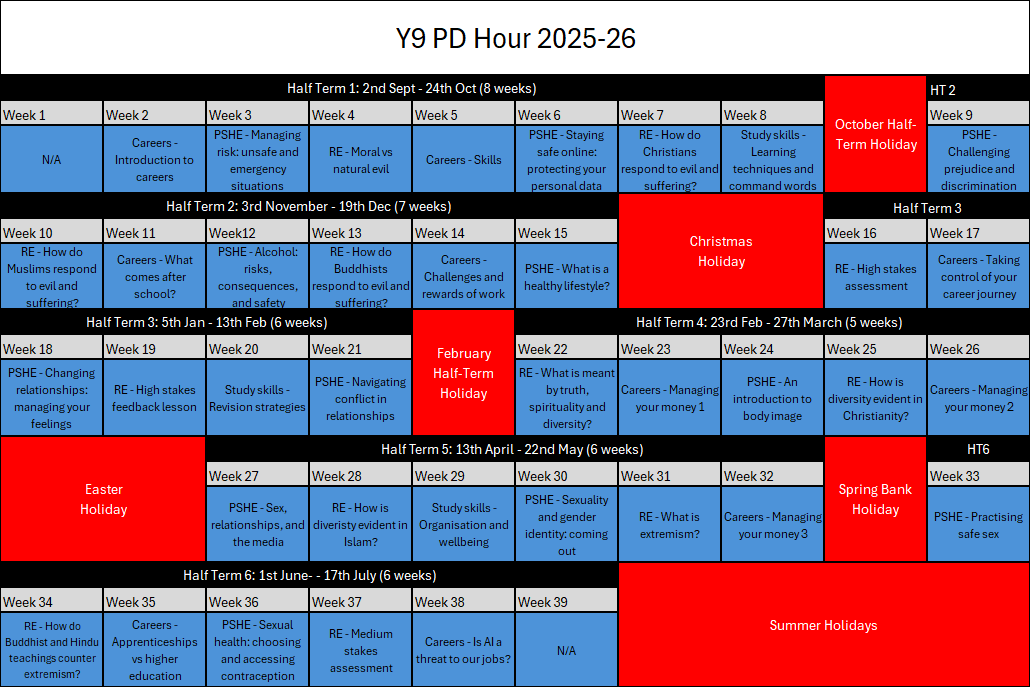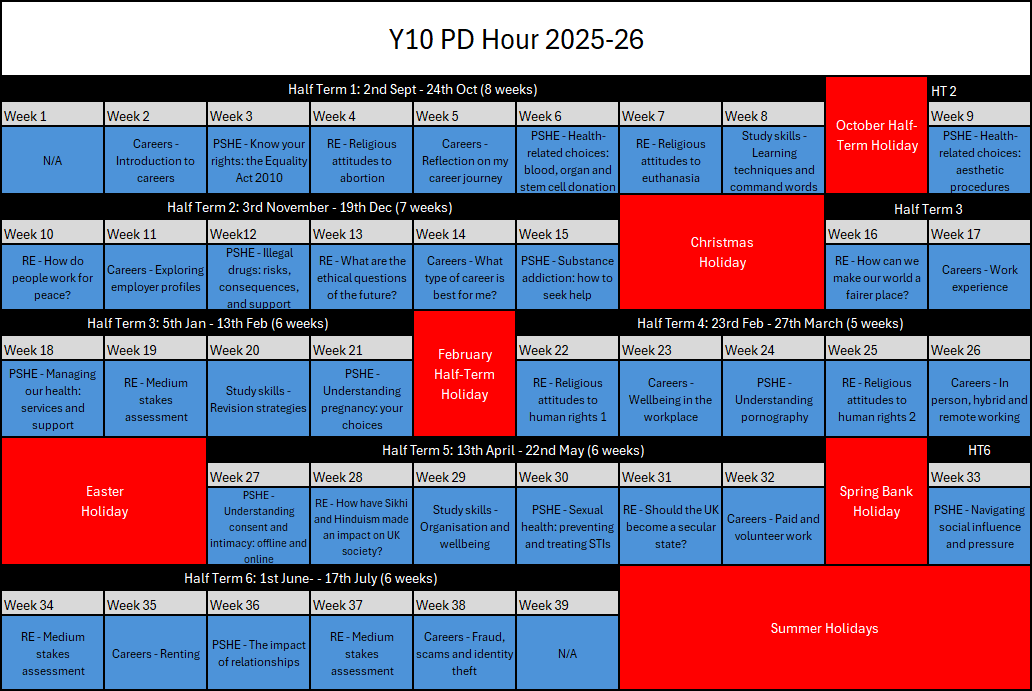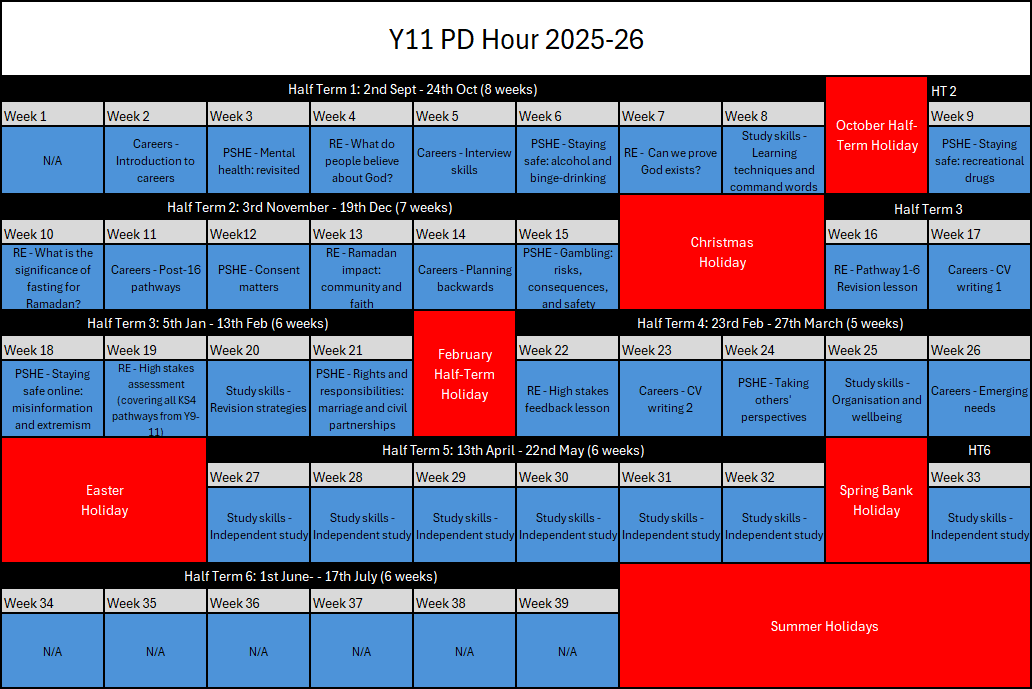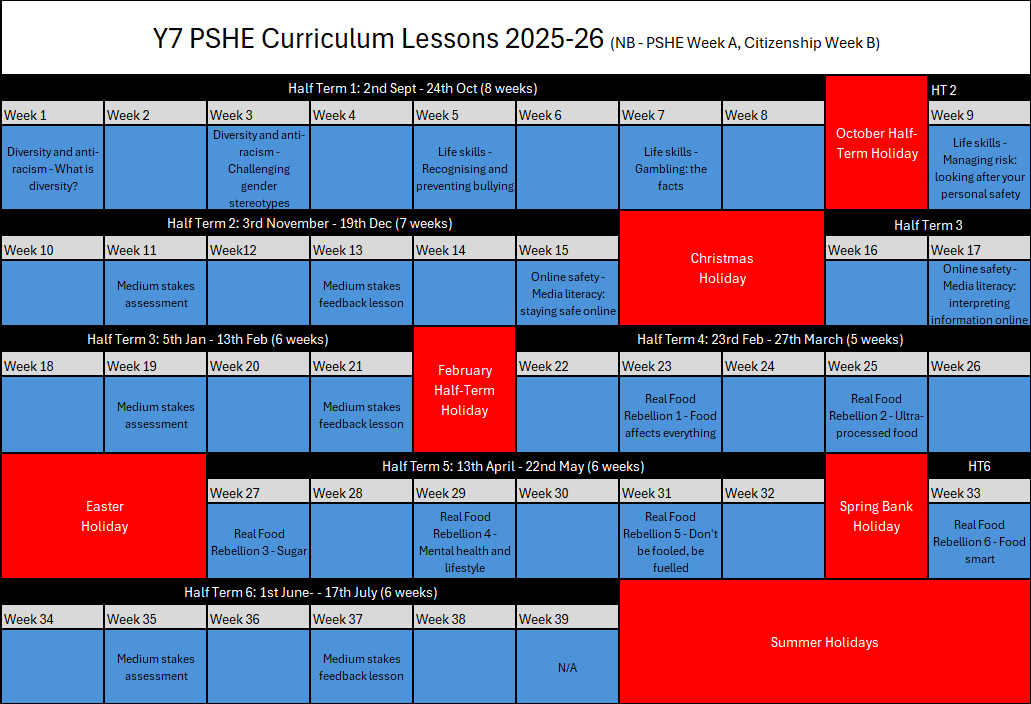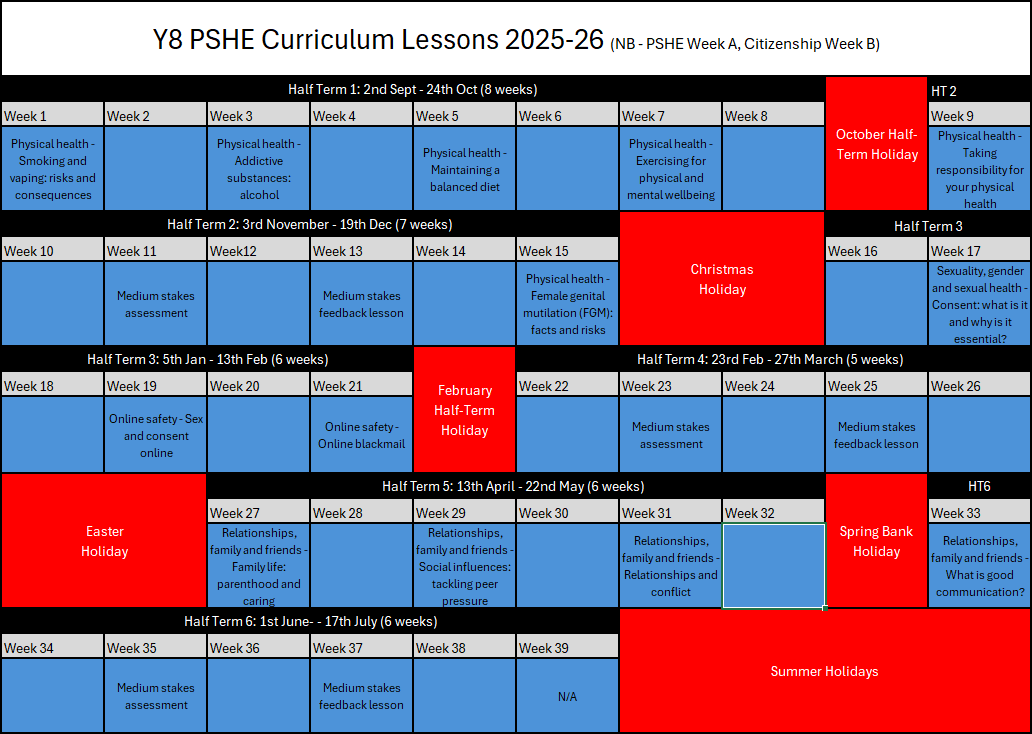PSHE
PSHE
Our PSHE curriculum aims to guide and support students in their journey towards becoming healthy, independent and responsible members of the community, through the development of their knowledge, skills and attributes. Throughout their time at Hungerhill, students will explore the rights and responsibilities associated with being a member of a diverse society and subsequently develop the confidence to tackle a wide range of spiritual, moral, social and cultural issues that they are likely to encounter in their transition from childhood to adulthood. Our PSHE Department strive to develop students’ self-esteem, health and emotional wellbeing and enable them to form and maintain worthwhile and fulfilling relationships based on respect for themselves and others at home, school and in the community.
Curriculum Model
- Year 7 and 8: PSHE lessons are delivered once per fortnight within students’ timetables (Week A PSHE, Week B Citizenship) as well as during PD hour, so that a wide range of topics can be covered early in their formative years.
- Year 9 to 11: PSHE lessons are delivered solely through PD hour to prioritise GCSE subjects in their regular timetables.
-
Please see the Route Maps at the bottom of this page for details on what is taught over the year.
Curriculum Outline
The PSHE curriculum is designed to support students’ personal development, wellbeing, and preparation for adult life. It provides guidance on key areas such as health, relationships, safety, and essential life skills, helping students to become informed, responsible, and resilient individuals. Overarching topic areas include:
- Diversity and Anti-Racism – Understanding equality, respecting differences, and challenging discrimination.
- Life Skills – Developing practical skills for everyday life, including decision-making, managing money, preparing for work, and building independence.
- Online Safety – Learning to stay safe, responsible, and respectful online, while managing risks such as cyberbullying, misinformation, and privacy issues.
- Physical Health – Promoting healthy lifestyles through nutrition, exercise, sleep, and personal safety to support long-term wellbeing.
- Relationships, Family and Friends – Building healthy, respectful relationships and understanding consent, communication, and support within families and friendships.
- Sexuality, Gender and Sexual Health – Receiving accurate, age-appropriate information about identity, gender, relationships, and sexual health, with a focus on safety and respect.
- Wellbeing and Mental Health – Developing resilience, coping strategies, and awareness of mental health, including where to find help and support.
This curriculum ensures students are equipped with the knowledge, skills, and understanding they need to navigate life confidently and responsibly.
Curriculum Aims
Develop the character of all students:
- Students develop a robust set of skills and attributes that will enable them to confidently face life’s challenges and opportunities, now and in a fast-changing future.
- Through the exploration of diversity within society, students are encouraged to become ‘self-aware’, whilst understanding the importance of neighbourliness and community spirit; tolerance and respect; honesty, integrity and dignity.
- Students will be exposed to a vast range of topics relating to health and wellbeing; stimulating curiosity and intrigue, as well as equipping students with the confidence, optimism and motivation to engage in positive behaviours and lifestyles as they progress into adulthood.
Ensure all students are literate and numerate:
- A scenario-based curriculum in PSHE enables students to be exposed to a broad range of texts, including newspaper articles, case studies and Government guidelines relating to health and the law.
- Students are encouraged to develop their emotional literacy skills through an exploration of the use of speech to effectively communicate emotions and feelings regarding physical and mental wellbeing and social diversity.
- Opportunities to contribute to numeracy skills are provided through financial awareness units, where students calculate budgets using income and expenditure; and also examining calorie intake through diet and exercise.
Build knowledge and aspirations of all students:
- Our PSHE curriculum equips students with the knowledge, understanding, skills and strategies required to live healthy, safe, productive, capable, responsible and balanced lives.
- The knowledge acquired by students is accurate and relevant, underpinned by high-profile case studies and relevant laws where appropriate, and opportunities are provided to turn such knowledge into personal understanding.
- Students are taught to apply the knowledge they acquire to real-life scenarios, encouraging them to identify and manage risk, make informed choices and aspiring to understand what influences their decisions.
Ensure all students have the secure foundations to progress into further education and employment:
- Students develop an understanding of themselves, empathy and the ability to work with others, thus assisting them to form and maintain good relationships, develop the essential skills for future employability and better enjoy and manage their lives.
- Students are encouraged to be enterprising, being supported in making effective transitions, positive learning and career choices.
- A study of risk-taking behaviours, including gambling and online safety, in addition to effective financial management provides students with the foundations to achieve economic wellbeing.
Develop cultural capital of all students:
- Our PSHE curriculum centres on spiritual, moral, social and cultural development, in addition to British Values, with an overall aim of providing students with the essential skills to become well-rounded and confident individuals.
- Through a taught awareness of the diverse society in which they live, students are encouraged to develop their sense of self-worth by playing a positive role in contributing to school life and the wider community.
- Students explore topics that have a personal impact on their day-to-day lives and communities, thus developing their understanding of their world and the impact personal decisions can make on their lives, as well as developing critical thinking skills.
How parents can help to support their child’s learning in PSHE
- Talk about issues explored in PSHE lessons
- Encourage an interest in the news and topical issues in society
- Keep up-to-date with social media apps and trends, and reinforce an understanding of how young people should keep themselves safe online
